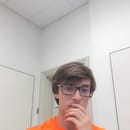Halloween is almost upon us, and you know what that means! It’s time to pull out the pumpkins, the costumes, the jack-o-lantern themed socks, the house decorations, and the scary movies to watch that will make you not want to go into any dark hallway (because you never know what might be lurking around there). But amidst all the horror movie excitement, one genre always seems to be forgotten.
You probably have never heard of Howard Phillips Lovecraft, or as he’s more commonly known, H. P. Lovecraft. He’s influenced a number of horror writers to this day including the likes of Stephen King himself with his creation of a new subgenre of horror, later named Lovecraftian Horror or Cosmic Horror. Describing what Lovecraftian horror is, is like explaining what his life was (which was a pretty awful one).
Photo via kdeuy on Pinterest.com
Born and raised in Rhode Island in 1890, his family was fairly well off for their time and his grandfather encouraged him to read and write. By age three, he was practically literate. He was probably the most paranoid person who ever lived at the time as he had a tremendous fear of the ocean, where a lot of his monsters originate, and was extremely racist to anyone who wasn’t of his superior New England blood. He also had the worst luck with his family. Both of his parents were institutionalized and his grandparents, who became a secondary parental figure, died when he was very young. This pushed Lovecraft over the edge, especially with the death of his mother, and he fell into a depression and found little reason to live. Around this time is where he started writing some of his first short stories for the pulp magazine Weird Tales. One of his most famous short stories was called “The Call of Cthulhu”, which was published in February of 1922. This story has the themes and ideas that would define Lovecraft’s later works, and that primarily involves the fear of the unknown.
Now fear of the unknown is nothing new. We’ve all feared something because we were uncertain of the outcome or because we were afraid of what lies beyond. Lovecraft takes these ideas and turns it up to eleven on a scale of ten. The unknown that Lovecraft often touches upon is primordial gods called the Old Ones that can bend space and time, and any attempt to understand them will lead to permanent insanity. No, you did not read that sentence incorrectly. The horror that is created from these topics is not necessarily that which brings out fear of dark corridors or uneasiness when they see someone wielding a knife; it is the existential dread of realizing that you are an insignificant being and any attempt to change that position is futile. Rationalizing it with science will prove ineffective and will only lead to perpetual madness. For Lovecraft, it is better to stay in ignorance than to fully realize where we are in the universe. In his short story “The Call of Cthulhu”, Lovecraft’s opening line is: “The most merciful thing in the world, I think, is the inability of the human mind to correlate all its contents”. This short story is basically a cautionary tale about what happens if one were to correlate the contents of the world, as a man puts together a series of isolated events and comes to a chilling conclusion. We are to these beings as fleas are to us: practically worthless.
Gif via g1ft3d on giphy.com
Although there have always been modern works that have utilized Lovecraftian Horror, there seems to be a rise of interest in this subgenre today. However, this doesn’t mean it wasn’t used in the past. A great Lovecraftian Horror story that came out forty years ago is the cult classic film “The Thing”, which is about a shape shifting alien that starts killing a team of U.S. scientists stationed in Antarctica. For a more modern example, “Stranger Things” fully encapsulates the elements of Lovecraftian Horror. The show involves beings from another dimension that we don’t fully understand even with our scientific abilities, unanswerable questions that may never be answered, and a sense of dread that the horrors from the Upside Down may always be around us. More examples that have Lovecraftian elements include “A Quiet Place” and “Annihilation”. For a piece of media to truly be Lovecraftian, there’s one thing it must have: leaving the audience with the unanswerable question of what is it they just saw, a question that humans cannot comprehend.
Some people may say that this is unfulfilling and a bit of a let down because as the audience, we should be entitled to know specifically what the main characters are truly facing against. But, that is part of where the horror and fear is created. Often we hear that the movie was scary until we saw the monster. Once we know what the threat is, we can learn how to destroy it. But how do you fight or even acknowledge something that you cannot see? Something so horrible, that even while glimpsing at it, you cannot possibly describe what it is that you see? Something so beyond what we as humans are able to comprehend that we will go mad just by gazing at it? That is Lovecraftian horror. While you might not feel afraid at the moment, once you finish the story you’ll feel a shiver go down your spine, and even begin to feel a different kind of dread.
“Cthulhu” by Andree Wallin via Tumblr.com
So if you’re wondering how you want to scare yourself at Halloween, try a Lovecraftian Horror story. It can be a movie based off the genre or it could be one of his own works (keep in mind if you do read his stories that he can be incredibly racist at times). It’s a chilling and refreshing way to experience horror and suspense that differs from other subgenres. But be forewarned: Lovecraftian Horror will not make you scream in a movie theatre or jump out of your seat. It will creep on as you lay in bed and begin to realize your place in the grand scheme of the cosmos and how compared to these supernatural entities, we are merely worthless specks of dust. That is Lovecraftian Horror, and isn’t that uplifting?



